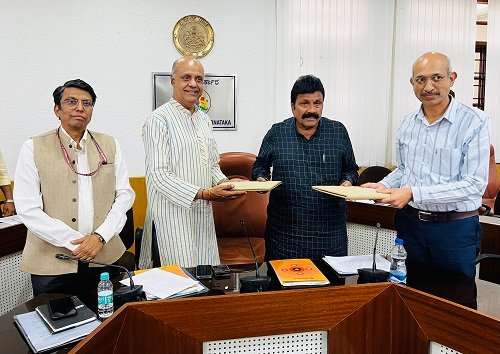Wadhwani AI inks MoU with Karnataka Govt to promote welfare of farmers
KSDA and Wadhwani AI will explore opportunities for the scaled deployment of the AI-powered early pest warning and advisory solution for cotton and other crops developed by Wadhwani AI.
The Wadhwani Institute for Artificial Intelligence announces that Wadhwani AI has entered into a formal partnership with the Karnataka State Department of Agriculture (KSDA). This is an important partnership and will go a long way towards realising our common objective of improving the welfare of farmers across the state of Karnataka. Through this partnership, the KSDA and Wadhwani AI will explore opportunities for the scaled deployment of the AI-powered early pest warning and advisory solution for cotton and other crops developed by Wadhwani AI.
Additionally, Wadhwani AI will work towards ensuring the AI-readiness of the KSDA and conduct capacity-building initiatives for ministry personnel on the responsible use of AI and its application to boost agriculture systems in the state.
“We look forward to collaborating with Wadhwani AI and leveraging their expertise in developing cutting-edge AI-powered solutions to enhance agriculture systems in Karnataka and improve the income of farmers. We intend to unlock the value of the agriculture pest and disease data at our disposal and utilise it to create novel solutions in crops like cotton, maize, chilli, and other crops in Karnataka, with the help of emerging AI-based technologies,” said, B. C. Patil, Minister for Agriculture, Government of Karnataka.
“Small farmers in India depend on government programs at every step of the crop cycle. Timely, accurate, and hyperlocal AI-based early-pest warning and advisory can augment human capabilities to overcome systemic challenges in these large-scale programs. I would like to extend my thanks to Ravi Trivedi from Nudge’s Indian Administrative Fellowship, who has facilitated the deployment of our solution in the Dharwad district and provided guidance and support towards our partnership with the KSDA and the signing of this MoU,” J. P. Tripathi, Associate Director – Agriculture, Wadhwani AI.
“We are committed to using AI to meaningfully impact the lives of low-income populations, in India and other developing countries. Ensuring that our AI solutions reach the communities most affected by the problems we are trying to address and can create a meaningful impact at scale is only possible by working closely with the government, said Shekar Sivasubramanian, Chief Executive Officer, Wadhwani AI.
KSDA and Wadhwani AI will explore opportunities


